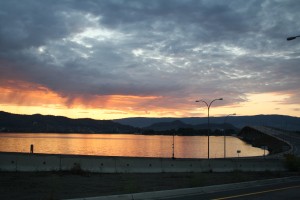In our group discussions we were addressing Max Weber’s “The Nature of the City,” in particular, we were debating about the question “Does Kelowna satisfy Weber’s definition of what a city is.”
At first glance, Kelowna satisfies most of Weber’s major attributes of a city; it has a court and partially autonomous law, and it is partially self-governing due to municipal elections. Kelowna also has a much larger connection to its hinterland than most modern cities because it is based on the tourism of its lakes, mountains and wineries. Kelowna has all of the properties that Weber mentions with the exception that Kelowna does not have a fortress or garrison. Kelowna has no surrounding walls, no great military base and no other major defense system to speak of. With this in mind, according to Weber, is Kelowna still not considered a city because it is lacking fortification?
In our group we delved into this topic and realized that Kelowna does indeed have a defense system in place, just not in the way that one might expect. While Kelowna may not have physical walls surrounding the city, the natural environment provides its own defense structure. If Kelowna were under attack, the city needs only to cut off access to the roads in and out of the city. By shutting down the bridge and blocking off the road to Vernon, there is virtually no direct access to Kelowna, except from boat or plane. Kelowna is also built into a natural valley; the mountains and lake surrounding the city form a natural defense against enemies. There is no protection from an aerial attack, but even with city walls that would be next to impossible to prevent.
In this respect, our group decided that Kelowna can, and should, have city-status.


In addition to natural fortifications it is also worthy to note that city of Kelowna possesses other forms of security; through various forms of social organization the residents of the city are responsible for the collective security of their community and the city as a whole. For example, the participation of residents in such associations as neighborhood watches; strata associations; and volunteer organizations is a form of collective security. At the University Campus we preserve collective security through such organizations as Safewalk amongst other initiatives. In a more formal sense the community is also protected by the presence of police detachments and the army (Vernon army installation) which could be could be considered the modern incarnation of the garrison.
I completely agree with your groups granting Kelowna its city status. To further address Jesses point as to the security of Kelowna, not only does it have the natural fortifications of the lakes, it also has the backing of the Canadian Armed Forces. When Weber first conceived and published his ideas on what a city was and what a city does, times were very different than they are now. In our modern age, the city does not NEED to defend its self due to the fact that the city has been incorporated into a larger social and governmental order that was not available to the cities of Weber’s time. With this new order, the city no longer needs to be individually defensible because an attack on a city is now an attack on the larger state and the country and thus the state and the country are responsible for the security and protection of the city.